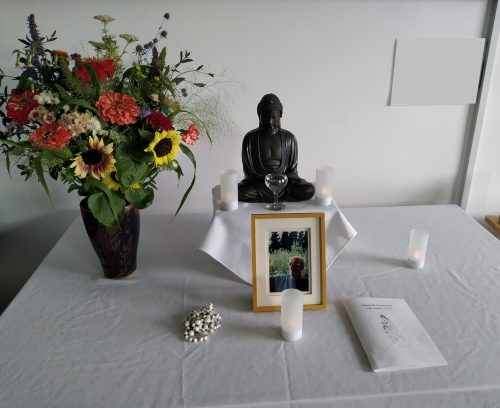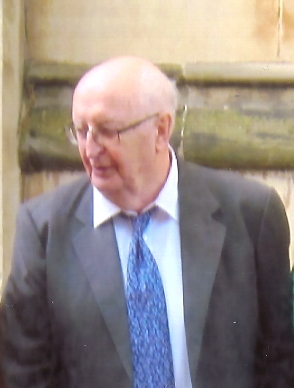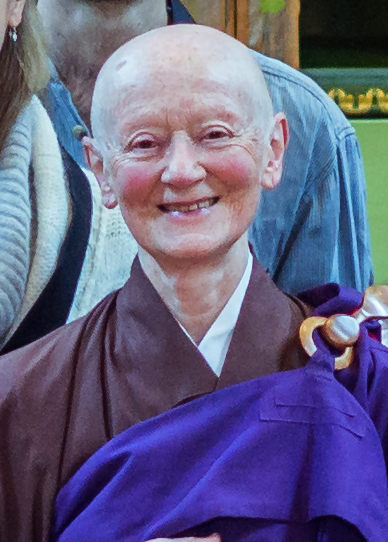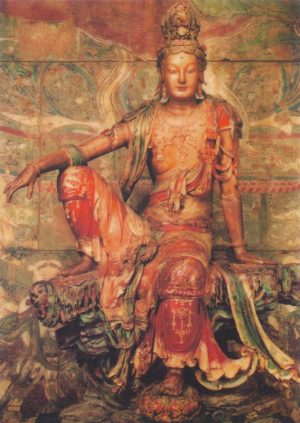September 2022 Newsletter
Funeral for John Ferris
In early August we were very sad to hear that John Ferris, our friend and long-time Sangha member from Nottingham, had died. His health had been declining for some time, and we received a message from his daughter that he had been taken into hospital. Rev. Aiden and several Sangha members were able to visit him there, as were many of his friends and relatives, and John died a few days after being admitted.
John was in his early eighties and had been an active member of the Nottingham meditation group for many years. He had been an academic at the University in Nottingham, and was a published author, and he was very highly thought of in his field of Sociology.
John’s funeral ceremonies were held on August the 23rd, with a private cremation in the morning which his close family attended, and then a public ceremony in the afternoon. The public ceremony was held at the Attenborough Nature Reserve in Nottingham, which was a very nice venue, and the main part of that was our memorial ceremony for John. A picture of the memorial altar is shown below.

The memorial included recitations of The Names of the Ten Buddhas, The Scripture of Great Wisdom, The Litany of the Great Compassionate One and the Adoration of the Buddha’s Relics, and we offered the merit of our ceremonial to John. The memorial was followed by some very nice eulogies from a family member and a work colleague.
Rev. Alicia came over from Cromford for the ceremony, and there were also half a dozen or so group members there, so there was a good Buddhist presence to say goodbye to John. Altogether there were probably 30-40 people there, including John’s family, friends and neighbours and work colleagues.

Some news from Throssel Hole
In mid-August, Throssel Hole Buddhist Abbey announced that their abbot, Rev. Master Leandra, had decided that the time had come for her to resign, for health reasons. You can see the full announcement on the Throssel Hole website.

The next abbot will be chosen by the resident monastic community at Throssel, and they will be going through that process over the coming weeks and months.
It was very kind of Rev. Master Leandra to take on the role of abbot in her eighties, and we wish both her and the community well as they go through this period of change.
Forthcoming Events: The Festival of Avalokiteshwara Bodhisattva
On Saturday the 10th of September we will be celebrating the Festival of Avalokiteshwara, the Bodhisattva of Compassion. The name Avalokiteshwara is Sanskrit (Japanese: Kanzeon, Chinese: Kwan Yin, Tibetan: Chenrezig), and means “The one who hears the cries of the world”. To live with compassion is to hear the cries of suffering within ourselves and within all beings, and to be willing to respond, and the festival will focus on this centrally important aspect of Buddhist practice.
On Saturday the 10th of September we will be celebrating the Festival of Avalokiteshwara, the Bodhisattva of Compassion. The name Avalokiteshwara is Sanskrit (Japanese: Kanzeon, Chinese: Kwan Yin, Tibetan: Chenrezig), and means “The one who hears the cries of the world”. To live with compassion is to hear the cries of suffering within ourselves and within all beings, and to be willing to respond, and the festival will focus on this centrally important aspect of Buddhist practice.
Buddhist Stories
There are many stories in Buddhism, from the time of the Buddha onwards, and they are very helpful in illustrating aspects of the Buddha’s teaching and Buddhist practice.
Seeing the Buddha Land
In this story from the Vimalakirti Sutra, the Buddha explains that the reason we don’t see this world as the Buddha Land is because we are not seeing clearly, not because of any fault of the world. The Buddha helps his disciple Shariputra to see the true nature of the world, allowing him to let go of his doubts about the teaching that the Buddha has been offering.
In the section leading up to this story, a Bodhisattva called Jewelled Accumulation (Ratna-rasi) has asked the Buddha how to purify lands so that they become the Buddha’s Pure Land. The Buddha answers by saying that it is not about making the world around us pure, rather that the straightforward mind of practice is itself the Buddha Land. He summarises this teaching by saying, “Jewelled Accumulation, a bodhisattva who wishes to acquire a pure land must purify their mind. When the mind is pure, the Buddha land will be pure.”
One of the Buddha’s chief disciples, Shariputra, is sitting in the assembly, and when he hears this he thinks to himself: “The Buddha says that if the mind of the bodhisattva is pure, then his Buddha land will be pure, but when the Buddha first decided to become a bodhisattva, surely his intentions were pure. Why then is this Buddha land so filled with impurities?” Shariputra is looking around at the world he sees, and he doesn’t like it.
The Buddha, knowing his thoughts, said to him, “What do you think Shariputra ? Are the sun and moon impure? Is that why a blind person can’t see them?”
Shariputra replied, “No, World-Honoured One. The problem lies with the blind person; the sun and moon are not to blame.” The Buddha points out that it is the same with the Buddha’s Pure Land, saying, “Shariputra, in the same way it is the failings of living beings that stop them from seeing the marvellous purity of the land of the Buddha; the Buddha is not to blame, Shariputra. This land of mine is pure, yet you fail to see it.”
At this time one of the Brahma kings pops up from somewhere (as a device to underline the Buddha’s message) and says to Shariputra, “The Buddha is quite right, you must not think that this Buddha land is impure. I say this because to my eyes Shakyamuni’s Buddha land is as pure and spotless as a heavenly palace.”
Shariputra isn’t at all convinced and says, “But when I look at this land, I see it full of knolls and hollows, thorny underbrush, sand and gravel, dirt, rocks, many mountains, filth and defilement.” Shariputra is not happy and doesn’t see a pure land; he sees all of the things that he considers to be inconvenient in this world, and wrong with this world. He sees muddy paths, rivers that he has to struggle to cross, and perhaps not enough food to eat some days.
The Brahma king replies to him, “The problem is just that your mind is up and down and isn’t grounded in Buddha wisdom, and so you see this land as uneven and impure. Shariputra, the bodhisattva sees all things and beings with impartiality and equanimity.” When we can look without judgement, then everything is much more straightforward. “A bodhisattva’s deeply searching mind is pure, and because it is in accord with the Buddha Dharma it can see that this Buddha land is also pure.”
Shariputra is unconvinced, you can just tell. He’s unconvinced because he doesn’t actually see it for himself. He still just sees this filthy world that’s very inconvenient.
The Buddha then presses his toe against the earth, and suddenly the whole world is transformed into a land adorned with precious jewels. Everyone present in the assembly sighs in wonder, as they have never seen anything like it before, and all of them see that they themselves are seated as Buddhas on jewelled lotus thrones.
The Buddha then says to Shariputra, “Now do you see the marvellous purity of this Buddha land?”
Shariputra replies, “Indeed I do, World-Honoured One. Something I have never seen before, and never even heard of.” (Everyone has been telling him about it throughout the scripture, but because he had no direct knowledge of it himself, he had been unable to take it in.) “Now all the marvellous purity of the Buddha land is visible to me!”
The Buddha says to Shariputra, “My Buddha land has always been pure like this. But it appears filthy to those whose minds are not pure, that is all. If a person’s mind is pure, then that person will see the wonderful blessings that adorn this land.”
When the Buddha revealed the marvellous purity of the land in this way, five hundred people who had accompanied Jewelled Accumulation all developed the patient acceptance of the teaching of No Birth and No Death, and eighty-four thousand people set their minds on attaining complete all-round enlightenment.
The Buddha then lifted his toe again, and the world returned to its previous appearance.
***
The crucial teaching here is that when the Buddha presses his toe on the ground, nothing changes. The Buddha land is as the Buddha land always was. The Buddha has changed the way in which Shariputra sees the world around him, but the world itself has not changed. When the story says that, “the whole world was transformed into a land adorned with precious jewels”, it is really Shariputra’s perception of the world that is transformed in this way.
It is like the example that the Buddha uses of the blind people who can’t see the moon or the sun. If the blind people had their sight restored then they would be able to see the moon and sun, but the moon and the sun wouldn’t have changed; they would be just the same as they were before. The problem lies in our perception.
The Buddha land is right beneath our feet. It is this world that we live in. What makes it be pure, and what makes it be impure? Well, if we see the world in a very judgemental way, and see difficulties and problems everywhere, then that is the world we make for ourselves. The Buddha says in the Dhammapada, “ Mind is the forerunner of all things”. We make our world from our thoughts, from our views, from how we see the world.
If instead we can let go of our judgmentalism, our hatred, our greed, in the way that we interact with others and with the world, then the world is much more straightforward. Actually, it doesn’t change, but we are much more able to cope with it, and respond appropriately to the situations we find ourselves in. The world doesn’t have all these ups and downs any more, because we are no longer attached to how other people behave, or how the world is; we accept things as they are. Yes, not everything is the same, and people can still behave in ways that cause harm; and, if we can let go of our own fear and desire, our own delusions, then all these ups and downs are much more even. They are not the great struggle that they seemed to be. If we can live in the world without being in conflict with the world, then for ourselves we have a world of no-conflict, we have a world which is much more straightforward, where we can just get on with people. When our minds are uneven, then for us the world is uneven. When our minds are straightforward, then for us the world is straightforward.
This is the Buddha’s central teaching in the story, which we started out with; When the mind is pure, the Buddha land will be pure. We should each look inwards at our mind, and turn our attention to our own views and opinions, doing our best to let go of all those which prevent us from seeing the already-present purity of this Buddha land.
Sources:
There are several translations of the Vimalakirti Sutra, and the story above is mostly based on the following two:
Luk, Charles (1975). Ordinary Enlightenment: A Translation of the Vimalakirti Nirdesa. Shambhala Publications. ISBN 0394730658.
Watson, Burton (1997). The Vimalakirti Sutra. Columbia University Press. ISBN 0231106564.
Alms Bowl Requests
Donations of Food
Offering food is a traditional way to support a monk, and all donations of vegetarian food are most welcome. In particular:
- porridge oats
- peanuts or other nuts
- peanut butter
- fresh fruit and vegetables (except garlic or peppers)
- dried herbs
- cheese, eggs and yoghurt
Any other suitable items would also be appreciated.
Donations
The temple is dependent on donations for its continued existence, and any financial support you are able to offer is greatly appreciated. Details of how to offer support can be found on the Donations page of the website.
All donations are received with gratitude



